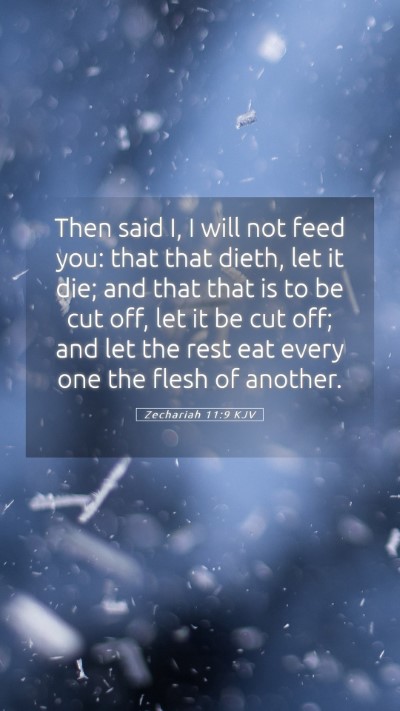Old Testament
Genesis Exodus Leviticus Numbers Deuteronomy Joshua Judges Ruth 1 Samuel 2 Samuel 1 Kings 2 Kings 1 Chronicles 2 Chronicles Ezra Nehemiah Esther Job Psalms Proverbs Ecclesiastes Song of Solomon Isaiah Jeremiah Lamentations Ezekiel Daniel Hosea Joel Amos Obadiah Jonah Micah Nahum Habakkuk Zephaniah Haggai Zechariah MalachiZechariah 11:9 Meaning
What is the meaning of Zechariah 11:9?
Then said I, I will not feed you: that that dieth, let it die; and that that is to be cut off, let it be cut off; and let the rest eat every one the flesh of another.
Zechariah 11:9 Bible Verse Meaning
Understanding Zechariah 11:9
Zechariah 11:9 states, "I said, I will not feed you: that which dieth, let it die; and that which is to be cut off, let it be cut off; and let the rest eat every one the flesh of another." This verse can be understood as a prophetic warning regarding the consequences of rejecting God and the shepherding roles established by Him.
Bible Verse Explanations
The verse represents a significant moment where the speaker, presumed to be Zechariah, expresses his withdrawal from the people due to their unfaithfulness. It serves as a metaphor for God's relationship with His flock, illustrating the dire consequences that follow when the shepherd (God) becomes disillusioned with His sheep (the people).
Scripture Analysis
- God's Disappointment: The refusal to feed is indicative of God's disappointment with Israel, revealing the depth of their rebellion against Him.
- Destruction and Cannibalism: The mention of "that which dieth" highlights a grim scenario where internal strife leads to a breakdown of community, as imagery of eating the flesh of one another suggests extreme desolation and conflict.
Insights from Commentaries
The interpretations provided by various scholars including Matthew Henry, Albert Barnes, and Adam Clarke collectively enrich our understanding of this verse:
- Matthew Henry: He emphasizes the symbolic rejection of the shepherd by the flock and how they will face dire consequences for their choices. The concept reflects the larger theme of struggle and judgment within Israel's history.
- Albert Barnes: Barnes delves into the profound implications of neglecting divine guidance, noting that such abandonment leads to moral decay and disunity among God's people.
- Adam Clarke: Clarke points out the metaphorical representation of false shepherds who misguide the people, leading to self-destructive behavior that ultimately devastates the community.
Application of Bible Verses
Understanding Scripture, especially difficult passages like Zechariah 11:9, encourages believers to reflect on their personal relationships with God and the importance of heeding divine guidance. This verse serves as a reminder of the dire effects of spiritual neglect and the transformative power of returning to God's will.
Historical Context
The context of Zechariah’s prophecy is framed within a period of restoration post-exile, highlighting the critical need for faithful leadership. In this proximity to historical events, we can glean insights into the societal dynamics at play, as they relate to God's shepherding role.
Cross References
- Jeremiah 23:1-4: Discusses the responsibilities of shepherds and the consequences of their negligence.
- Ezekiel 34:1-10: Highlights God's imminent judgment on the unfaithful shepherds of Israel.
- Matthew 24:12: Reflects on the increase of wickedness and its effect on love among people.
Conclusion
Zechariah 11:9, through its vivid imagery and powerful warnings, challenges readers to engage in Bible study insights and Biblical exegesis to uncover the profound implications of unfaithfulness to God. This verse is not merely a historical account but serves as a relevant call to today's believers in understanding the importance of faithful living.


